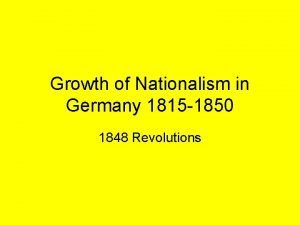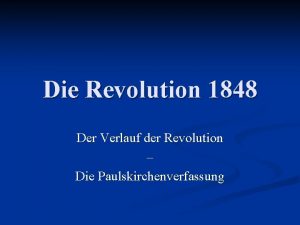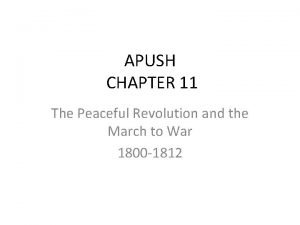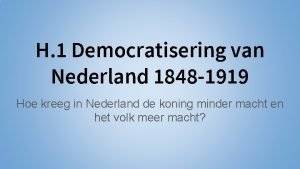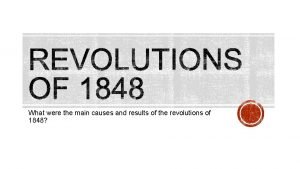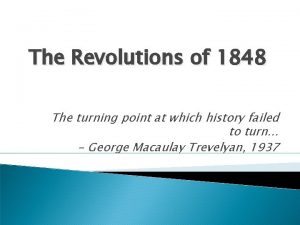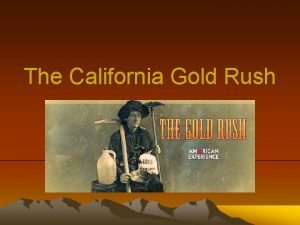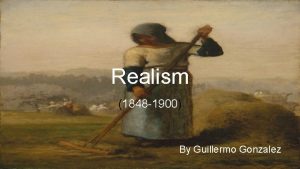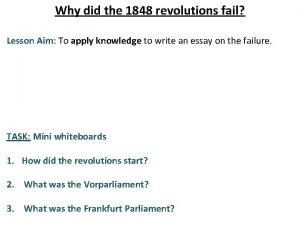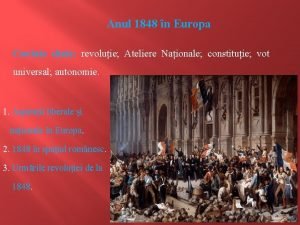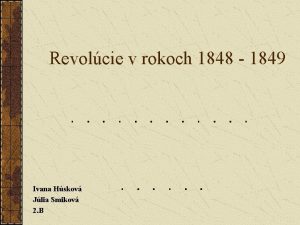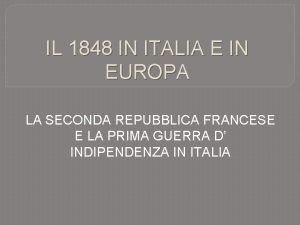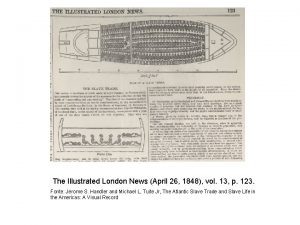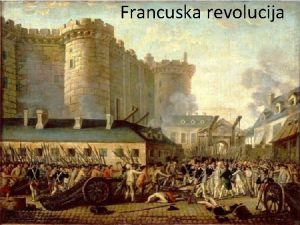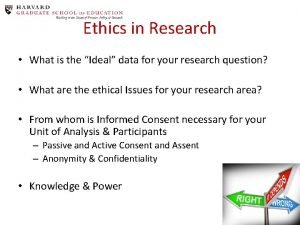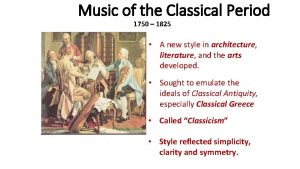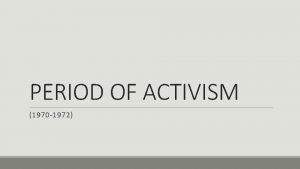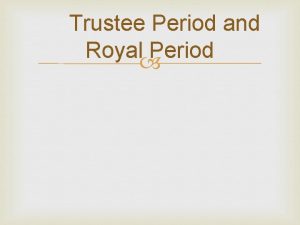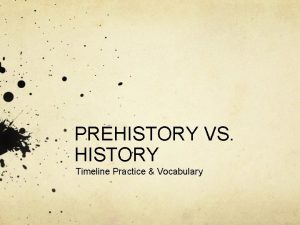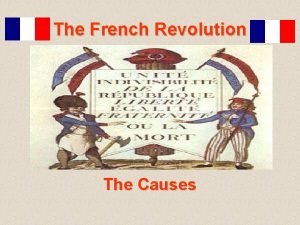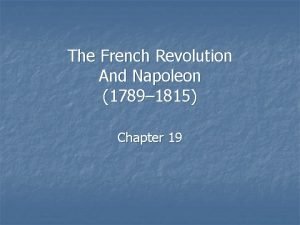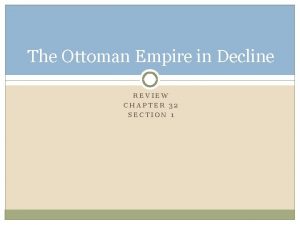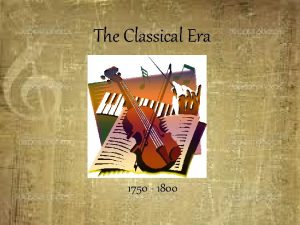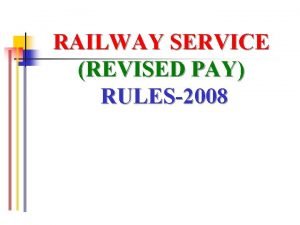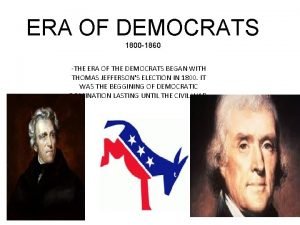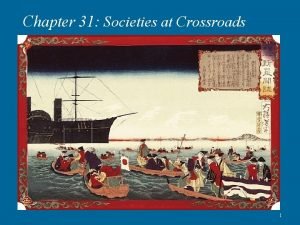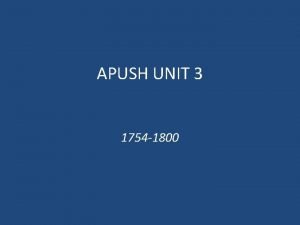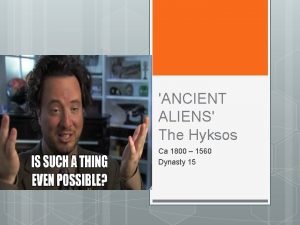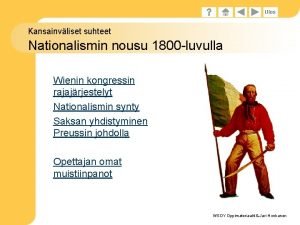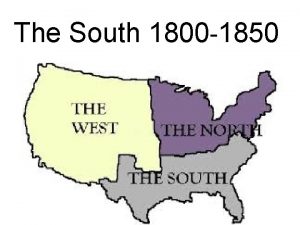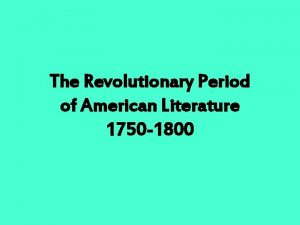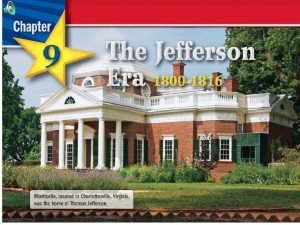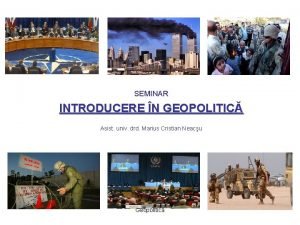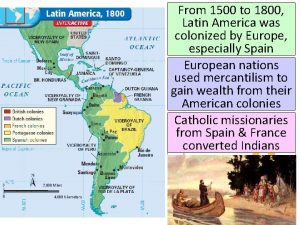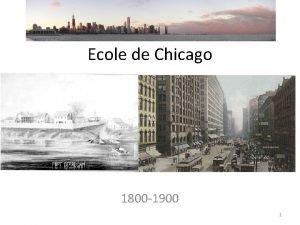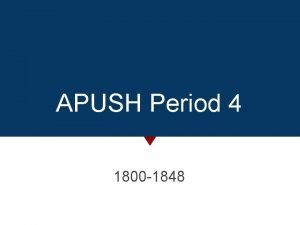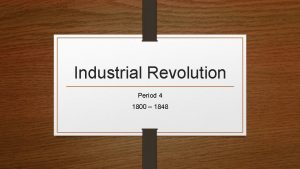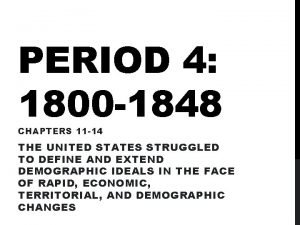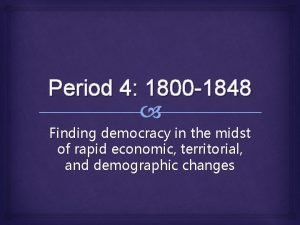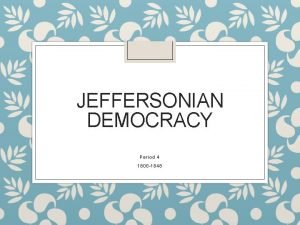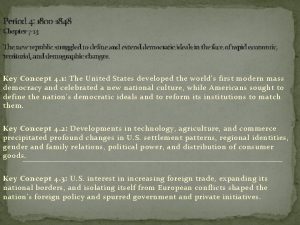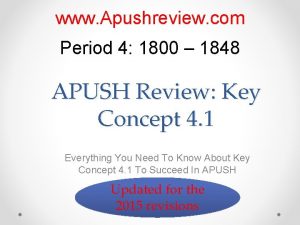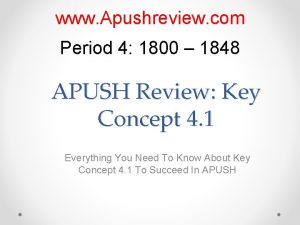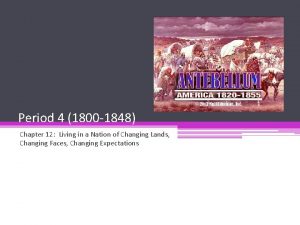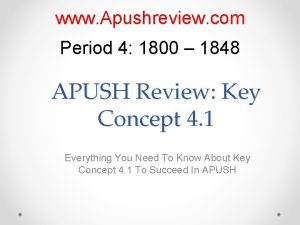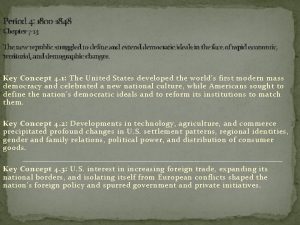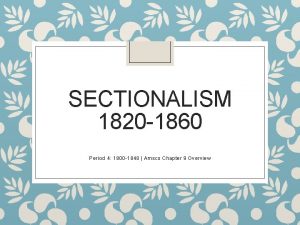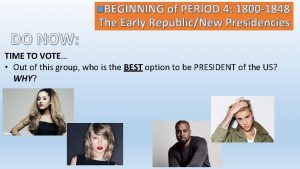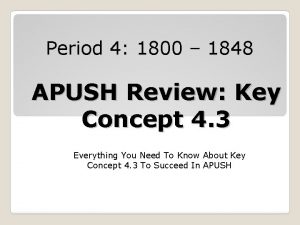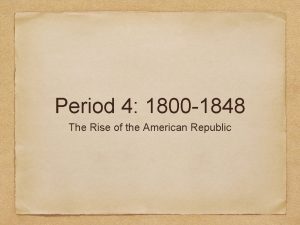Period Four 1800 1848 The Revolution of 1800















































































































- Slides: 111

Period Four 1800 -1848

The “Revolution of 1800” • Jefferson wins, Burr becomes VP – Peaceful transfer of power among parties – 12 th Amendment • Jefferson keeps virtually all of Hamilton’s policies in place (not excise tax) • “We are all Republicans, we are all Federalists. ”

The Nation Expands The Age of Jefferson • Jefferson’s Political Beliefs – farm ownership was the basis for a successful American society (An Agrarian society) • Problem = Population doubling every 25 yrs. & need twice as much land every generation • Louisiana Territory – 1801 Napoleon forced Spain to give him the Louisiana Territory – Napoleon needs money to fight the British – 1803 Jefferson paid $15 million & doubles the size of the US • Was this Constitutional?

Emerging Judicial Branch • Judiciary Act of 1801 – Created 16 new judgeships and other offices • “Midnight Judges” – Last minute appointments by Adams prior to leaving office • JOHN MARSHALL (KNOW HIM AT ALL COSTS) – Served 34 years – INCREASED THE POWER OF THE FEDERAL GOVERNMENT

More Judicial Branch • Marbury vs. Madison (1803) – Marbury sues Secretary of State Madison – Part of Judiciary Act ruled unconstitutional – ***SIGNIFICANCE*** • Judicial Branch is the sole interpreter of the constitution • Sets the precedent that the Supreme Court can declare laws unconstitutional • Samuel Chase: – Impeached by Republicans – due to personality – Found not guilty in the Senate – Significance: No real serious attempt has been made to reshape S. C. by impeachment

Expansion How did American expansion reflect the development of an American identity and American nationalism?

Expansion • Overview – Inventing a Nation – Washington, Adams, and Jefferson 1. The Nation Expands Lewis and Clark War of 1812 – – 2. Age of Jackson Trail of Tears Nullification – – 3. Mexican American War – – • – Justification Impact Wilmot Proviso Sectionalism

Analyze the Expansion of the United States




The Nation Expands • 1804 - Lewis and Clark expedition explore new territory – Aided by Sacajawea & her husband

The Louisiana Purchase • Jefferson tries to buy NO from the French for $10 million. • Livingston and Monroe are offered all of Louisiana for $15 million! • Jefferson thought this was necessary to the country, but felt it was unconstitutional • Role reversal of strict vs. loose interpretation • US doubled in size

Aaron Burr • Burr plotted a secession of New England – Burr challenges Hamilton to a duel and kills him – His political career is over, tries to separate western part of US • Arrested and tried for treason. – Found not guilty – Flees to Europe and urges an alliance between France and England against US

A Precarious Neutrality • America is caught between Britain and France – Berlin Decree (1806): France would confiscate ships trading with Britain – Orders in Council (1806): Britain’s response to France, forced ships trading with France to stop in Britain first to be loaded with goods • IMPRESSMENT: – Forcible enlistment of American merchants and sailors into the British navy • Chesapeake Incident: – British warship fires on American ship, kills 3, injures 18. Angers Americans greatly

The Hated Embargo • Embargo Act of 1807: – Forbade export of ALL goods from US, no matter the destination – Intent was to make France and Britain respect America’s rights • The plan backfired horrifically – Economy of US takes a huge hit – New England was hurt the most (Federalists are angry) – Act revoked in 1809

• Non-Intercourse Act: – Reopened trade with all nations of the world, except Britain and France – US economy is still hurting, needs those two large countries to trade with • Positives of embargos? – Beginnings of the Industrial Revolution are born – Factories begin to pop up in New England • Jefferson, who believed agriculture should be the main industry, helped spark industry (supported by Federalist Party)

Macon’s Bill #2 • Purpose: to entice Britain or France to repeal shipping restrictions • U. S. would maintain its embargo against the nation that didn't sign on • Leads to US embargo against Britain, helps fuel the War of 1812

Why war with Britain and Not France? 1. War Hawks pushed Madison toward war 2. Traditional Republican (Jeffersonian) partiality toward France 3. Visibility of British impressments and arming of Amerindians. 4. Chesapeake-Leopard Affair 5. Lure of conquering British Canada: timber, fishing, fur trade.

Chapter 12 Review

The War of 1812 Q: Why did the United States of America go to war with Britain and what was its outcome? Causes • British Interfere with American Shipping • British interfere with American Expansion into western frontier • Southerners want Florida, which is owned by Britain's ally Spain • American ‘War Hawks’ want to expel Britain from North American completely War • US invades Canada… Fails • 1814 -British march on Washington D. C. , sack the city, and burned down the White House. • 1814 -American troops defend better than they invade. – Slowly American forces defeat the British across the country.

The War of 1812 Q: Why did the United States of America go to war with Britain and what was its outcome? Impact of the War • The Treaty of Ghent ends the war, – which does not address any of the causes of the war… but • 2 weeks later Andrew Jackson wins the Battle of New Orleans – Creates the illusion that Jackson had forced the British into the treaty • Growth of American Nationalism Long Term Impacts • The nation is free to grow and expand into western territory and into the newly acquired Spanish Florida.

Growth of Nationalism Review • The Louisiana Purchase grows the expanse of the US • The War of 1812 helps to create a nationalistic spirit and opens the way for westward expansion

Nationalism How did domestic and foreign policies reflect the nationalism of the early 1800's? Domestic Policies Foreign Policies • American System (by Hamilton) • Expansion into Florida – National Bank to encourage commerce • The Monroe Doctrine 1823 – Tariffs to protect & strengthen – ***Further Efforts by American industry European nations to colonize land or interfere in the – Federal subsidies for roads, canals Americas would be viewed as and other ‘internal improvements’ an act of aggression, • More power to the Supreme requiring US intervention Court • All colonies of Spain & Portugal had become independent • Supported by many Presidents

War of 1812 Military Highlights • Battle of Tippecanoe: – William Henry Harrison defeats Native Americans • Battle of New Orleans: – 2 weeks AFTER Treaty of Ghent, Andrew Jackson defeats British – HUGE INCREASE IN NATIONALISM • Treaty of Ghent: (HENRY CLAY!!!!) – Ended war: armistice, no gains or losses

Hartford Convention • Purpose: Discuss their complaints and seek compensation for losses during the war. • Some delegates urged secession • Proposed amendment to Constitution: 2/3 of Congress must agree for embargo, new states to be admitted, or war to be declared • This was the deathblow for the Federalist Party – Most of America experienced a sense of NATIONALLSIM!!!

“The American System” • Tariff of 1816: – first tariff in American history instituted to protect industries, not raise revenue • Henry Clay’s (Speaker of the House) American System (Know all 3 parts!!!) B ank of US (2 nd) 1. Strong Banking system (provide credit) Bank of the I nternal Improvements US st T arrifs (1816 – 1 2. Protective tariff which would help industries 3. Network of roads and canals, esp. in Ohio, valley Protective Tariff) that would help link the country together

“Era of Good Feelings” • James Monroe’s Presidency – Coined by Boston newspaper, death of the Federalist party – Some issues including; slavery, panic of 1819 • Causes of Panic of 1819: – Immediate cause: Overspeculation on frontier lands by banks (especially BUS)

The Uneasy MO Compromise • ME = Free, MO = Slave • Balance between free and slave states at 12 • 36˚ 30’: everything above would prohibit slavery – Most of US above that line – Helps contribute to sectional differences • MO Compromise lasted for 34 years

John Marshall and Judicial Nationalism • ***John Marshall increased the power of the federal government*** • Mc. Culloch v. Maryland (1819) – MD tried to tax a branch of the BUS; Marshall does not allow it • Cohens v. Virginia (1821) – Supreme Court is allowed to review decisions of state courts. – Again, federal government more powerful than states

More court cases (KNOW THEM!!) • Gibbons v. Ogden (1824) – NY grants monopoly to boat company on Hudson (involving trade between NY and NJ) – Marshall says NO! Congress has sole control over interstate trade • Fletcher v. Peck (1810) – States cannot “impair” contracts – Supreme Court can invalidate state laws conflicting with Constitution

One more case • Dartmouth College v. Woodward (1819) – Issue over NH trying to change charter of college – Marshall says the charter was a contract and “the Constitution protected contracts against state encroachments” • Marshall helped fuel NATIONALISM!!!!

Sharing Oregon and Acquiring Florida • Treaty of 1818: – Set the northern limits of Louisiana purchase at 49 th parallel • Florida Purchase Treaty of 1819 – Spanish ceded Florida, US gives up claims to TX

Monroe and His Doctrine • Monroe Doctrine (1823) – US warns all of Europe to 1. Not colonize Latin America 2. Not intervene in Latin America – In return, US would stay out of European affairs • Reinforces nationalism • Europe is angry, L. A. indifferent • Doctrine has more of an impact in later years

Chapter 13 The Rise of a Mass Democracy

The “Corrupt Bargain” of 1824 • 4 candidates for president, none win majority of electoral votes; goes to House – Vote on top 3; as per 12 th amendment; Clay out – Clay (Speaker of House) throws support to Adams – Adams wins, Clay becomes Secretary of State • Jackson, who won majority of popular vote is furious Death, AKA “Henry Clay”

John Quincy Adams • Former Secretary of State – Did not use patronage, or spoils system – Party members began to question why support him if there is no reward • America began to turn towards sectionalism during this time; long removed from nationalism from War of 1812

“Old Hickory” as President • Was seen as a “common man” since he was born in a log cabin • Democracy increases during his presidency: – Elimination of property requirements to vote – Universal white male suffrage • Strong unionist & nationalist (to dismay of South); federal supremacy over states. • Spoils System: – Rewarding political supporters with public office

Andrew Jackson What changes did Andrew Jackson represent in American political life? Andrew Jackson’s Presidency “a mixed legacy” • Andrew Jackson was elected by popular vote; – sought to act as the direct representative of the common man Should Andrew Jackson be on the 20 dollar bill? • Democrats develop a new party structure • Government jobs given to members of the wining party (the Spoils System) • Indian Removal Act

http: //www. youtube. com/wat ch? v=Vm 9 HZq 53 rq. U Dairy farmer Colonel Thomas S. Meacham of Sandy Creek, NY, sent Jackson a wheel of cheese that was four feet in diameter and two feet thick, weighed nearly 1400 pounds, and was wrapped in a giant belt that bore patriotic inscriptions like, “The Union, it must be Preserved. ” By 1837 Jackson’s second term was winding down, So he decided to make the famed fromage a featured player at his last public reception at the White House. It was an astute move; there’s nothing people love more than free food. The reception’s 10, 000 visitors attacked the wheel of cheese with such fervor that the entire thing was gone within two hours.

Tariffs • Jackson supporters in Congress pushed for high tariffs, hoping to make Adams look bad – Tariffs surprisingly passes, Jackson inherits mess – What region would most be opposed to high tariffs? Why? • Tariffs, especially this one, promote sectional differences • South Carolina proposed that the states should nullify the tariff – What two states tried to nullify the Alien and Sedition Acts?

“Nullies” in South Carolina • Tariff of 1832 – Reduced the tariff amount, but still high enough to anger the South • South Carolina legislature nullifies tariff – Threatened to secede from union if federal government tries to collect duties • Jackson threatens to hang “nullies”, including his former VP Calhoun!

I’m Back Baby!!!!! My 2 nd Major Compromise in 13 years. Continued • Henry Clay helps resolve issue: • Compromise Tariff of 1833: – Tariff would be reduced by 10% per year for 8 years – Civil war is averted • Force Bill passed by Congress as face-saving device – President in the future could use military to collect federal tariffs if necessary. – Dubbed "Bloody Bill" by South Carolinians. • Impact: Stepping stone to Civil War; SC eventually moves from nullification to secession

Henry Clay Never Dies!

Constitutional Disputes Emerge Nullification = The idea that a state could refuse to recognize or to enforce a federal law passed by the United States Congress if that state disagreed with it. • The Nullification Crisis began over tariff passed by Congress – South Carolina declared the tariff unconstitutional. • (They also blocked the collection of the tax at their seaports. ) • Andrew Jackson came out against nullification – Willing to use force to maintain the union • John C. Calhoun supported nullification – Proposed seceding from the Union • End Result: A compromise tariff was passed and succession avoided The state of South Carolina made an attempt in nullifying a federal law. “Can a state refuse to enforce a federal law passed by the United States Congress? ”

“Can a state refuse to enforce a federal law passed by the United States Congress? ” The Issue Current Events Connection • The 10 th amendment grants States all the powers not reserved by the Federal gov’t or prohibited the States… • Does this mean states can pass laws contradictory to Federal laws? • • • March 2010 – 4 states have passed laws that nullify federal regulation on commerce within state boundaries Sanctuary Cities direct local police not to work with ICE or arrest anyone for being an illegal immigrant National Health Care nullification – 30 states have proposed laws & 4 have passed laws that would nullify the national health care system 16 states have passed laws allowing the use of medical marijuana & as of 2012 2 states allow anyone 21 or older to posses an ounce for whatever purpose. As of 2013 27 states proposed laws nullifying federal authority over local firearms

The Trail of Tears • 1790 s, US government recognizes tribes as separate nations; agrees to acquire land through formal treaties • Indian Removal Act (1830) – Removal of Natives (inc. 5 “civilized” tribes) beyond the Mississippi River • “Trail of Tears” – 18, 000 Cherokees forcibly removed from their homes and marched 1, 000 miles to Indian Territory (Oklahoma).

2 important Court Cases • Cherokee Nation v. Georgia (1831) – Court ruled that the Cherokee nation was not a foreign nation with the right to sue in Federal Court • Worcester v. Georgia (1832) – Ruled that the laws Georgia had no force within the boundaries of the Cherokee land the Cherokee could not be required to move West. – Jackson: "John Marshall has made his decision; let him enforce it if he can. "

The Bank War • Jackson hated BUS, declaring it unconst. – Vetoed new charter of bank – Used the veto 12 times in presidency, all presidents combined for 10 vetoes prior to Jackson – Veto is used because he doesn’t like the bank • 1833, Jackson decides to bury bank by removing federal funds – Nicholas Biddle, president of bank, calls in loans, creates a “panic” • 1836, economy is spinning out of control, Jackson issues, Specie Circular: – All public lands be purchased with “hard” currency – Helps contribute to panic and crash in 1837

The Election of 1836 Who were the “Van Buren Boys? ” • Martin Van Buren, VP during Jackson’s second term • Whigs hoped to throw election into House • MVB wins 170 – 124 (all Whigs combined)

Panic of 1837 • What caused Panic of 1837? – – – Speculation of western land Bank War Specie Circular Failure of wheat crops Hessian fly (brought to the US by Hessian soldiers during Revolutionary War) • Pet Banks: – Banks which the government deposited funds after death of BUS • Divorce Bill: – Separating the government from banking altogether • Independent Treasury Bill (1840) – Later repealed, then reenacted, separates government funds from private banks.

Mexico and Texas • Mexico becomes independent in 1823

Gone to Texas • 1823, a newly independent Mexico granted Stephen Austin what is today Texas: – Immigrants were to be Catholic – Properly Mexicanized. • 1830, Mexico emancipated slaves, tensions between Mexico and US

The Lone Star Rebellion • Texas declares independence in 1836 – Sam Houston named commander in chief – Santa Anna (leader of Mexico) sends 6, 000 troops into Texas – Alamo: 13 day siege, all Americans are killed • San Jacinto: – Sam Houston captures Santa Anna, sings 2 treaties • Withdraws Mexican troops, recognizes boundary of Texas • Texas wants to join Union • Fear from North that about issue of slavery • Jackson recognizes Republic of Texas on last day of office

Log Cabins and Hard Cider of 1840 • William Henry Harrison vs. MVB in election • WHH adopts log cabin and hard cider as campaign platform • Significance of election: – First mass-turnout election in American history – Propaganda and silly slogans set unfortunate example for future campaigns.

The Two-Party System Democrats Whigs • Favored local rule • Limited government • Free trade, equal economic opportunity (for white males) • Made up of Southerners, westerners and urban workers. • Favored Clay’s American System • Opposed immorality and unlimited immigration • Made up of New Englanders, Protestants, middle class urban professionals.

Chapter 14 Review

What was the “Market Revolution? ” • Industrial Revolution Transportation Revolution: roads, canals, steamboat, railroad • Change from subsistence farming to large-scale cash-crop farming. • Regional specialization: East, West and South • Immigration: Irish and German (U. S. need for labor) • Westward movement • Growth of cities

Immigration • 1840 s and 50 s immigration skyrockets, why? – “Land of freedom and opportunity” – Abundance of land in US – Disease • Mid 1840 s, potato famine strikes Ireland – ¼ of country dies due to disease/hunger – “Black Forties” • Period when many Irish died/emigrated to other countries • Most lived in cities, not enough $ to move west • Jobs: – “NINA” – Canal workers – Erie Canal – Hated by “Native” Americans for “stealing” jobs due to low wages • Become a powerful political force: patronage, voting – Democrats • Largest group of immigrants from 1830 to Civil War

Nativism • “Nativists” – Hated foreigners, fear of losing culture, jobs, etc. • Religious Fears – Many Irish were catholic, fear that would infringe on Protestantism • Order of the Star Spangled Banner, “Know. Nothing Party” – Political party that hoped to: • Restrict immigration and naturalization laws

Inventions and Inventors • Samuel Slater: – “Father of Factory System” – Memorizes plans for machines, sneaks to US • Eli Whitney: – Created Cotton Gin, 50 times more effective than handpicking – Impacts of cotton gin: • Dependence on slavery which had been dying out • Factory system in north to create clothes

Inventions Continued • Due to embargos, Americans encouraged to “Buy American” and “Wear American” • Treaty of Ghent in 1815 opens up trade again, GB floods US with cheap products – US’ response? Tariff of 1816, first protective tariff – Who will like this? Who will hate this? • Interchangeable Parts: – Invented by Eli Whitney, machines produce identical parts, if a part breaks, it can easily be replaced • John Deere: – Invented steel plow that broke soil • Cyrus Mc. Cormick – Mechanical mower-reaper

Factory Life • Factory life stunk – Long hours, low pay, child labor, “whipping rooms” • Lowell Girls: – Farmers’ daughters hired to work in factories • Significance of factories: – Change in manufacturing from home to factories • 1840: – MVB establishes 10 work day for federal employees • Strikes were illegal and rare, but did happen • Commonwealth v. Hunt: – Massachusetts Supreme Court • Decision: Labor unions legal, so long as they were not violent or subversive • More symbolic than immediately significant.

Transportation • Cheap and efficient carriers were imperative – Why? • Desire and need to tap resources of west • Trade • Lancaster Turnpike – Connected Philadelphia to Lancaster, 62 miles – Spurs construction of other roads • By 1832, 2, 400 miles of roads connecting major cities • Robert Fulton – Steam Engine, now boats could go in any direction

“Clinton’s Big Ditch” in NY • Erie Canal: – 363 miles from Buffalo to Albany – Hudson River to Great Lakes • Cost to ship grain fell from $100 to $5; 20 days to six • Creation of many cities in NY, especially Lockport • Inrastate commerce

Effects on the Union • By Civil War, continental economy had emerged • Division of Labor applied on a national scale – South: Agriculture – North/East: Factories – West: Livestock

Chapter 15 Review

Key Religions • Deism: – Relied on reason rather than revelation, science rather than the Bible – Believed in God • Unitarians – God only existed in 1 person; Jesus is not divine – Free will, possibility of salvation through good works

• Religion is becoming more liberal, in need of a revival……. Sound familiar? • First Great Awakening was a reaction to the Enlightenment, Second Great Awakening was a reaction to Deism and Unitarianism. • Second Great Awakening: – “Born Again Christians” – Reorganized churches into new sects or branches – Encouraged new reform movements: prison, temperance, women’s movement, slavery • AP LOVES TO TEST ON THIS!!!

A Desert Zion in Utah • Joseph Smith: – Church of Jesus Christ of Latter-Day Saints (Mormons) • Mormons became a powerful collective unit in terms of voting • 1844, Smith is murdered • Brigham Young: – 1846 -47 led the Mormons to Utah – Becomes a prosperous frontier society – Due to polygamy issues, Utah is not admitted as a state until 1896

Free Schools for a Free People • Education was seen as way to instill republican values • Focus in school was more on discipline than learning • Horace Mann: – Key reformer of education, promoted more schools, longer days, and expanded curriculum • Noah Webster: – Dictionary helped standardize the American language – Textbooks and readers used by millions of Americans • Black Slaves in the South were legally forbidden from learning to read and write

An Age of Reform • Second Great Awakening inspired Americans to battle evils – Puritan vision of a perfected society: no cruelty, war, intoxicating drink, discrimination, and slavery • Women played a key role in reform movements: could escape the confines of home • Other changes in Society: – Prison reform, imprisonment for debt, mental health reform (DOROTHEA DIX!!!)

Temperance and Prohibition • Heavy Drinking decreased labor efficiency and fouled the sanctity of the family • American Temperance Society (Boston, 1826): – Urged drinkers to quit alcohol, organized children’s clubs • Neal S. Dow: – “Father of Prohibition” – Maine Law of 1851 prohibited the manufacture and sale of intoxicating liquor, encouraged other states to pass laws • Openly flouted, later declared unconstitutional or repealed

Women in Revolt • Ind. Rev. separated women and men into sharply distinct roles • Elizabeth Cady Stanton: advocated suffrage for women • Susan B. Anthony: lecturer of women’s rights • Seneca Falls Convention (1848) – Stanton read a “Declaration of Sentiments” which declared that “all men and women are created equal” – Launched the modern women’s rights movement

Thank you for spreading my message! Trumpeters of Transcendentalism • Truth "transcends" the senses – Every person possesses an inner light that can illuminate the highest truth and put him/her in direct touch with God, or the "Oversoul. “ • People can become one with nature: Thoreau lived in woods for two years Thank you David! • Ralph Waldo Emerson: – Walden – Advocated self-reliance and self-improvement • Henry David Thoreau: – On the Duty of Civil Disobedience – protest of the Mexican American War • Influenced Gandhi and MLK

Chapter 16

King Cotton • Much like tobacco of colonial days, cotton was a large cash crop that ruined land • Economic spiral -> more slaves -> more land -> more slaves, etc. • Northern industries benefited from cotton – How? • Eli Whitney’s cotton gin increased the need for slavery in the south

Southern Life • South was, in a sense, an oligarchy: – A government by the few – In 1850, 1, 733 families owned more than 100 slaves • Dominated Southern politics • South was least democratic area of the US – Huge gap between rich and poor • By 1860, nearly 4 million slaves, quadrupled since 1800…… why? • ¼ of white southerners owned slaves, yet most southern whites defended the system – Many hoped they would one day be able to buy a slave or two – They felt racially superior – Higher socially than slaves

Free Blacks: Slaves Without Masters • Free blacks were throughout the South – 250, 000 in number – Purchased their freedom with earnings from labor after hours – Many southern states passed laws limiting freedoms of free blacks • In the North, they numbered 250, 000 as well – Disliked by Irish immigrants. Why? • Faced tension and discrimination anywhere they went

Plantation Slavery • Legal Importation of slaves ended in 1808 – Slave Trade Clause in Constitution • Bulk of the increase in population came from procreation • Slaves were sold like animals, and often, with animals at auctions – Families often broken up – Uncle Tom’s Cabin

Harsh Treatment for Slaves • Conditions varied from region to region – Most worked sun up to sun down – No civil or political rights – If few rights were violated, slaves couldn’t testify in court • By 1860, most slaves were in deep South: SC, GA, AL, MS, LA • Distinct new African American culture emerges that combined African and American cultural influences

The Burdens of Bondage • 90% of adult slaves were illiterate at start of Civil War • How to “fight back” against slavery? – Worked slowly, broke machines and equipment, running away, etc. – Most common form of resistance, NOT rebellions • Slave Rebellions: – Stono Rebellion: 1739, SC slaves fled to Florida, were unsuccessful – Denmarck Vesey: SC, 1822, planned largest ever revolt, never materialized, hanged with 30 others – Nat Turner: 60 Virginians killed, mostly women and children • Significance of all slave rebellions: – Clamped down on slavery in South, harsher laws and punishments

Early Abolitionism • Abolitionism: Movement that demanded an immediate end to slavery • First started during colonial era under Quakers • American Colonization Society: – Focused on transporting Blacks back to Africa – Abe Lincoln, Henry Clay • By 1860, almost all slaves were native-born • 1833: Britain ends slavery in West Indies – US one of last places that still allows slavery • American Slavery as It Is – Theodore Dwight Weld, Uncle Tom’s Cabin – Harriet Beecher Stowe, from………………. .

Radical Abolitionism • William Lloyd Garrison (KNOW HIM!!) – Published The Liberator, wanted North to secede from the South – ***Immediate and uncompensated end to slavery*** • American Anti-Slavery Society – Wendell Philips, would not eat cane sugar or wear cotton cloth • David Walker – Black abolitionist, Appeal to the Colored Citizens of the World, called for a bloody end to white supremacy • Frederick Douglas – Former slave, escaped slavery at age 21 – Lectured widely to end slavery, was subject to frequent beatings and threats

The South Fights Back • By 1830, abolitionist movement in South was silenced – 1831 -32, VA legislature defeated emancipation propositions – Leads to slave states tightening slave codes • Nat Turner’s revolt coincided with The Liberator – Garrison was viewed as a terrorist, GA offered $5, 000 for his arrest and conviction • Gag Resolution – All antislavery appeals were forbidden to be discussed in Congress – Eventually repealed with help of John Quincy Adams • South banned anti-slavery messages in the mail

The Abolitionist Impact in the North • Garrison not embraced in North for a while – Many respected the Constitution and slavery was allowed under it • Southern planters owed $300 million to Northern banks – Fear of money being lost if the Union dissolved • Many Northerners opposed allowing slavery in Western territories. “Free Soilers”

The American Dream • What do you think the American Dream is?

American Exceptionalism Define • The belief that America was special, and had an obligation to grow and prosper. • Supported by the idea that America was ‘different’ from other nations b/c – ‘first new nation’ – American ideology (egalitarianism, republicanism, individualism…) – “City upon a Hill” that sets an example for all other countries Impact • Mixed Results: – This served the interests of the ruling elite while working to establish America as a factor beyond its borders.

Is America Exceptionalism? Two views Two Views Where did this idea come from? • The theory of exceptionalism can be traced to Alexis de Tocqueville, the first writer to describe the United States as "exceptional" in 1831 and 1840. US History Standard 11: Understands the extension, restriction and reorganization of political democracy after 1800. Benefits Drawbacks

How is American Exceptionalism connected to the idea of an ‘American Dream’? Quick Write 1. Take one ‘American Dream’ from the chalkboard 2. Analyze how this dream connects to the definition of American Exceptionalism. 1. Is the American Dream unique to America? – Do you think other nations or cultures have aspirations similar to our own? (success, freedom, progress as a society…) 2. Are there other countries in history that have also viewed themselves as exceptional? (use an example)

Causes • Manifest Destiny: the belief that America is meant to spread west • Americans begin to settle in the Texas region – At 1 st encouraged by Mexican gov’t… but on the condition they follow Mexican laws Outbreak of War Timeline 1. Texans rebel against the gov’t in 1835 2. Declare independence in 1836 3. Mexico retaliates by attacking the Alamo 4. Generalissimo Santa Anna defeated… Surrenders Texas 5. Mexico does not honor the peace treaty – no agreement on border 6. Congress Annexes Texas in 1845 7. President James Polk sends Troops to the contested borderland 8. Border clash starts the Mexican. American War


Polk and Manifest Destiny When should a country go to war? Discussion Question • Was Manifest Destiny a new idea or merely a new term for a well established American pattern of expansion?

Effects of the War – Territory exchanged: 1. The Mexican territorial claims relinquished in the Treaty of Guadalupe Hidalgo in white. 2. Gadsden Purchase in brown

Mexican American War What were the effects of the Mexican American War? Effects • The Treaty of Guadeloupe Hidalgo, US gains territory (but will it be slave or free? ) – Rio grade is the new southern border of Texas • Wilmot Proviso – Would have banned slavery in any area gained from the war…failed to pass • Mexican-Americans stripped of land rights • Native Americans terrorized and killed • California Gold rush led to debate over slavery – California finds gold population boom apply for statehood debate over slavery Discussion Can it be said the effects of the war put America on a disastrous path to war?

“Tyler Too” • Election of 1840: WHH wins, dies 30 days into office – John Tyler becomes President, blocked Webster and Clay’s plans • John Tyler – Former Jacksonian Democrat, switched to the Whigs because he didn’t like Jackson – Leads to conflict with Whigs, claiming he was still a Democrat

Trouble with Britain • British travel books ridiculed America: lynching, slave auctioneering, eye gouging, etc. • 1837, Caroline incident: – British force attacked ship on Niagara River, set the ship on fire • Creole incident: – 130 slaves rebelled and captured the ship, Britain offered asylum to the slaves – Fear that Caribbean would be a haven for slaves like Canada

Manipulating the Maine Maps • “Aroostook War”: – Dispute n ME between American and Canadian lumberjacks threatened all-out war • Webster-Ashburton Treaty (1842) – Americans retained 7, 000 square miles of the 12, 000 in dispute – British got the Halifax-Quebec route

Election of 1844 • Election of 1844: James K. Polk (Democrat) vs. Clay (Whig), Polk wins • As a lame duck president, Tyler believed he should acquire Texas • Texas was annexed by a joint resolution which required a majority in both houses, rather than a treaty which requires 2/3 approval in the Senate • 1845 Texas was invited to be the 28 th state

Polk the Purposeful • Polk’s presidency can be summarized as COIL: – California – Oregon – Independent Treasury – Lower tariffs • Reduced tariffs to 25% from 1842’s 32% • Restored the Independent Treasury (killed by Tyler) • Acquired California • Settled Oregon territory dispute

Misunderstandings with Mexico • Polk wanted to buy CA, but Mexico was reluctant to sell • Mexico still viewed Texas as theirs • Rumors of Britain buying or seizing California scared Americans • US envoy instructed to offer $25 million for California

American Blood on American (? ) Soil • Polk orders General Zachary Taylor (future president) to march near Mexico TX boundary – What former Presidents were also Generals? • April 25, 1846 Mexican troops attacked Taylor’s troops killing or wounding 16 • Polk urges Congress to go to war – Many in Congress, including Lincoln want to know exact spot attack occurred (Spot Resolutions)

Fighting Mexico for Peace • Nicholas Trist negotiated treaty with Mexico • Treaty of Guadalupe Hidalgo – U. S. gained California, and modern-day NM, AZ, UT and NV -- ½ of Mexican territory – U. S. to pay $15 million

Wilmot Proviso (So important it gets its own slide) • David Wilmot, representative from PA was afraid of slavery expanding – Introduced an amendment that stipulated that “slavery should never exist in any form of the territory to be wrestled from Mexico” • Wilmot Proviso never becomes federal law, but endorsed by most free states – Ideas later adopted by Free-Soil Party

Manifest Destiny • How has the idea of Manifest Destiny shaped the American character?

Sectional Differences Develop How did the North and the South differ during the 1800's? North • Industrialized Quickly • Cities grew • Middle Class was created • Wave of immigrants arrive South • Mainly Agricultural • Cities stayed small • Slow population Growth • Education system was poor quality Both *Relied on cotton *Benefited from new technologies


Sum it all Up The Establishment of America and an American Identity 1. The American Revolution – Causes – Effects 2. The Constitution – Articles of Confederation • Weaknesses – Constitutional Convention • Proposals and Compromises 3. Debate over the Constitution – Federalists vs. Anti-Federalists 4. Constitutional Principles – Structure of Government – Individual Rights The Expansion of America and the conflicts that this causes 1. The Nation Expands Lewis and Clark War of 1812 – – 2. Age of Jackson Trail of Tears Nullification – – 3. Mexican American War Justification Impact – – • – Wilmot Proviso Sectionalism

Assessment of American Democracy Activity 1. Read “A foreigner’s Assessment of American Democracy” 2. Grade Americans for their progress toward equality from the writing of the Declaration of Independence to the end of the Jacksonian era. 3. Read Harriet Martineau’s evolution of American Democracy in the 1830 s and write a short paragraph summarizing her main idea. Grading America • • Political Equality Economic Equality Social Equality Religious Freedom


http: //www. geocurrents. info/geopolitics/map ping-forms-of-government-in-the-18 th-century -and-today
 Humiliation of olmutz
Humiliation of olmutz 1848 revolution germany
1848 revolution germany Revolution 1848 verlauf
Revolution 1848 verlauf Großdeutsche lösung
Großdeutsche lösung Revolution of 1800 apush
Revolution of 1800 apush Leto 1848 leto revolucij
Leto 1848 leto revolucij Leto 1848 in slovenci
Leto 1848 in slovenci Leto 1848 in slovenci
Leto 1848 in slovenci Democratisering van nederland 1848 tot 1919
Democratisering van nederland 1848 tot 1919 Bolzano (1781 – 1848)
Bolzano (1781 – 1848) Austrian empire 1848
Austrian empire 1848 Austroslavism
Austroslavism January 24 1848
January 24 1848 Revolucije u europi 1848
Revolucije u europi 1848 Realism (1848–1900)
Realism (1848–1900) Katonadalok 1848
Katonadalok 1848 Why did the 1848 revolutions fail
Why did the 1848 revolutions fail Anul 1848 in europa
Anul 1848 in europa Revolucije u evropi
Revolucije u evropi Francúzska revolúcia 1848
Francúzska revolúcia 1848 Vynález mikrofonu umožnil konstrukci
Vynález mikrofonu umožnil konstrukci Il 1848 in europa e in italia
Il 1848 in europa e in italia Illustrated london news 1848
Illustrated london news 1848 Francuska revolucija
Francuska revolucija Russian revolution vs french revolution
Russian revolution vs french revolution You should hope this game will be over soon
You should hope this game will be over soon The third agricultural revolution
The third agricultural revolution Period of revolution formula
Period of revolution formula Critical period vs sensitive period
Critical period vs sensitive period A&p flix activity: generation of an action potential
A&p flix activity: generation of an action potential Absolute refractory period and relative refractory period
Absolute refractory period and relative refractory period Critical period vs sensitive period
Critical period vs sensitive period Critical period vs sensitive period
Critical period vs sensitive period Approaches to child development
Approaches to child development 1750s music
1750s music 12 neutrons; metal; 11 electrons
12 neutrons; metal; 11 electrons The seeds of activism in 1972 resulted in
The seeds of activism in 1972 resulted in Stability period vs measurement period
Stability period vs measurement period Trustee period and royal period
Trustee period and royal period Prehistory vocabulary
Prehistory vocabulary 4 stages of french revolution
4 stages of french revolution Phases of the french revolution
Phases of the french revolution Four phases of the french revolution
Four phases of the french revolution Electronic age
Electronic age Hình ảnh bộ gõ cơ thể búng tay
Hình ảnh bộ gõ cơ thể búng tay Frameset trong html5
Frameset trong html5 Bổ thể
Bổ thể Tỉ lệ cơ thể trẻ em
Tỉ lệ cơ thể trẻ em Chó sói
Chó sói Tư thế worms-breton
Tư thế worms-breton Alleluia hat len nguoi oi
Alleluia hat len nguoi oi Môn thể thao bắt đầu bằng từ đua
Môn thể thao bắt đầu bằng từ đua Thế nào là hệ số cao nhất
Thế nào là hệ số cao nhất Các châu lục và đại dương trên thế giới
Các châu lục và đại dương trên thế giới Công thức tiính động năng
Công thức tiính động năng Trời xanh đây là của chúng ta thể thơ
Trời xanh đây là của chúng ta thể thơ Cách giải mật thư tọa độ
Cách giải mật thư tọa độ 101012 bằng
101012 bằng Phản ứng thế ankan
Phản ứng thế ankan Các châu lục và đại dương trên thế giới
Các châu lục và đại dương trên thế giới Thể thơ truyền thống
Thể thơ truyền thống Quá trình desamine hóa có thể tạo ra
Quá trình desamine hóa có thể tạo ra Một số thể thơ truyền thống
Một số thể thơ truyền thống Cái miệng nó xinh thế chỉ nói điều hay thôi
Cái miệng nó xinh thế chỉ nói điều hay thôi Vẽ hình chiếu vuông góc của vật thể sau
Vẽ hình chiếu vuông góc của vật thể sau Thế nào là sự mỏi cơ
Thế nào là sự mỏi cơ đặc điểm cơ thể của người tối cổ
đặc điểm cơ thể của người tối cổ Thế nào là giọng cùng tên? *
Thế nào là giọng cùng tên? * Vẽ hình chiếu đứng bằng cạnh của vật thể
Vẽ hình chiếu đứng bằng cạnh của vật thể Tia chieu sa te
Tia chieu sa te Thẻ vin
Thẻ vin đại từ thay thế
đại từ thay thế điện thế nghỉ
điện thế nghỉ Tư thế ngồi viết
Tư thế ngồi viết Diễn thế sinh thái là
Diễn thế sinh thái là Dạng đột biến một nhiễm là
Dạng đột biến một nhiễm là Các số nguyên tố
Các số nguyên tố Tư thế ngồi viết
Tư thế ngồi viết Lời thề hippocrates
Lời thề hippocrates Thiếu nhi thế giới liên hoan
Thiếu nhi thế giới liên hoan ưu thế lai là gì
ưu thế lai là gì Khi nào hổ con có thể sống độc lập
Khi nào hổ con có thể sống độc lập Khi nào hổ mẹ dạy hổ con săn mồi
Khi nào hổ mẹ dạy hổ con săn mồi Sơ đồ cơ thể người
Sơ đồ cơ thể người Từ ngữ thể hiện lòng nhân hậu
Từ ngữ thể hiện lòng nhân hậu Thế nào là mạng điện lắp đặt kiểu nổi
Thế nào là mạng điện lắp đặt kiểu nổi Sonia deluanay
Sonia deluanay 4 eyes in 4 hours
4 eyes in 4 hours Map of ottoman empire 1800
Map of ottoman empire 1800 Classical music eras
Classical music eras Grade pay 1800 means
Grade pay 1800 means Nationalism i europa
Nationalism i europa British empire in 1939
British empire in 1939 French fashion 1800
French fashion 1800 Whig party beliefs
Whig party beliefs Map of ottoman empire 1800
Map of ottoman empire 1800 1754 to 1800 apush
1754 to 1800 apush 1800-1560
1800-1560 Encounters and foundations to 1800
Encounters and foundations to 1800 Nationalismi 1800-luvulla
Nationalismi 1800-luvulla South 1800
South 1800 Romantic period american literature
Romantic period american literature Revolutionary period of american literature
Revolutionary period of american literature The election of 1800 showed that
The election of 1800 showed that Harta europei 1800
Harta europei 1800 1800 luvun aatteet
1800 luvun aatteet 1800 pyramid place memphis tn 38132
1800 pyramid place memphis tn 38132 Latin america 1500 to 1800
Latin america 1500 to 1800 Pencounters
Pencounters Encounters and foundations to 1800 comprehension answers
Encounters and foundations to 1800 comprehension answers Chicago 1800
Chicago 1800 Dtx 1800 120
Dtx 1800 120
